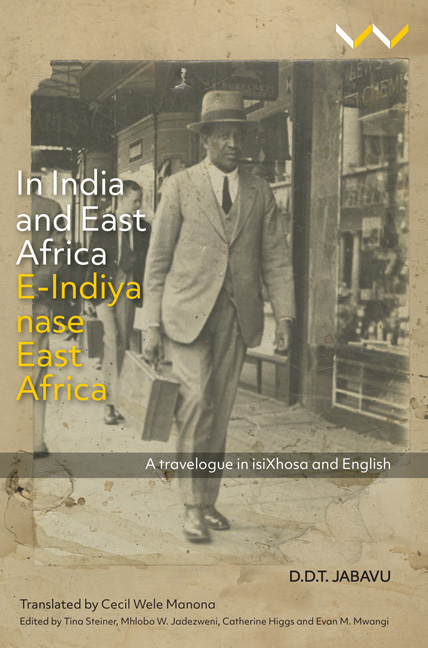Book contents
- Frontmatter
- Contents
- List of Illustrations
- Maps
- Acknowledgements
- Networks of Solidarity: D.D.T. Jabavu’s Voyage to India
- Revisiting D.D.T. Jabavu, 1885–1959
- Notes on the Original and the Translation
- In Praise of Cecil Wele Manona, 1937–2013
- E-Indiya nase East Africa
- In India and East Africa
- Afterword: Jabavu and African Translations for the Future
- References
- Editors’ Biographies
- Index
Chapter 6
Published online by Cambridge University Press: 27 March 2020
- Frontmatter
- Contents
- List of Illustrations
- Maps
- Acknowledgements
- Networks of Solidarity: D.D.T. Jabavu’s Voyage to India
- Revisiting D.D.T. Jabavu, 1885–1959
- Notes on the Original and the Translation
- In Praise of Cecil Wele Manona, 1937–2013
- E-Indiya nase East Africa
- In India and East Africa
- Afterword: Jabavu and African Translations for the Future
- References
- Editors’ Biographies
- Index
Summary
Uganda
The train travelled fast and eventually entered Uganda. I was told that many people died during the construction of the railway line. For each mile one person died. The stations have English names, and some of the names are similar to Xhosa names and Sotho names: Budumba, Fela, Bukoba, Juba, Khala, Khonza, Lushoto, Manyano, Miritini, Mkhomazi, Molo, Mbulamuthi, Mukhomo, Munyu, Phuma, Same, Soga, Songwa, Thanga, Yala. This is the reason why it is said that Uganda is the original place of the Bantu-speaking peoples. At some stage, we arrived at a station which is called Equator. We stood there and tried to place one foot in the Southern Hemisphere and the other one in the Northern Hemisphere. Travelling is learning. Indeed, my friend!
The abundance of Uganda
On Friday 27 January 1950, we arrived in the centre of Uganda, a land which has much natural wealth and vegetation. I was told a story about a certain young Englishman who had no food in England, who became a stowaway on a ship which was heading for Uganda. When he got here he lived in the forests which offered food in abundance and lived there for many years. One day he was discovered by the police and was found guilty of being without visible means of subsistence. He was sent back to his home country. This shows that English law is irrational, it does not know that a person can subsist without working. There is plenty of food here. In all the sidings there are people who sell bunches of bananas for only a tickey a dozen. Each banana is as large as a baby's leg. I ate two and was full. I did not know what to do with the others as I was heading for Kampala, where there were more bananas. I bought a pineapple for a tickey and it was as big as a pumpkin, and I could not finish it. While cutting it with my pocket knife, I remembered the clan praises of amaGqwashu, the brave ones of Nohibane, the family of Khamlana, the ones who cut the pumpkin! The natural abundance in Uganda is like the Garden of Eden found by Adam and Eve. I did not see any starving people or beggars. The country was rich in sweet potatoes, beans, sorghum, tobacco, maize and sugar.
- Type
- Chapter
- Information
- In India and East Africa / E-Indiya Nase East AfricaA Travelogue in isiXhosa and English, pp. 265 - 273Publisher: Wits University PressPrint publication year: 2019



